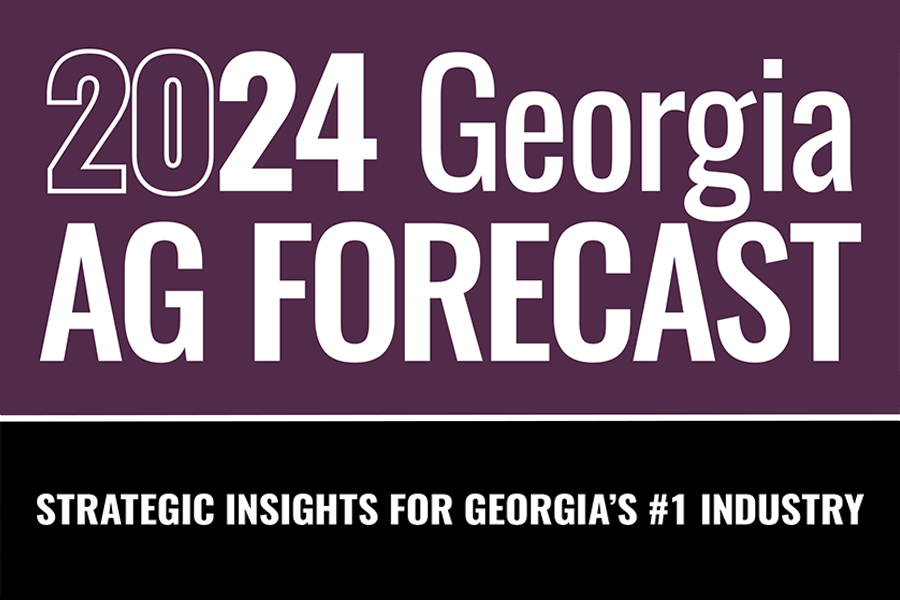Agricultural Development
-

AP 130-2
2024 Georgia Ag Forecast
Each year, UGA’s agricultural economists develop a comprehensive overview to help various sectors of the agriculture industry navigate the year ahead. As Georgia’s land-grant university, the University of Georgia conducts cutting-edge research on critical and emerging issues that are important to the agriculture industry. From this research, UGA provides the best information and education available to producers and constituents to equip them with knowledge and decision-making tools for their businesses.
The 2024 forecast includes these sectors:
1. U.S. Economic Outlook
2. Georgia Agriculture Economic Outlook
3. Inputs and Production Expenditures
4. Cotton
5. Peanuts
6. Corn, Soybean, Wheat
7. Poultry
8. Beef Cattle
9. Dairy
10. Fruits and Tree Nuts
11. Vegetables and Pulses
12. Green Industry: Nursery, Greenhouse, and Turf
13. Timber Situation and Outlook
14. Agritourism, Hospitality, and Travel
15. Georgia’s Alcoholic Beverage IndustryBen Campbell
|
-

Starting a farming or commercial production enterprise requires more than knowledge of agriculture or livestock management. The business side of farming is a critical factor in the success and sustainability of the enterprise. This resource can help answer common questions that beginning farmers have about planning, licensing requirements, financing options, training, and more.
Heather Kolich and Amanda R Smith
|
-

Many people view wetlands as “wastelands,” having few virtues. But it is now known that wetlands provide many useful services, from improving water quality to providing habitat for important fish and wildlife. These kinds of benefits would be costly to create, so maintaining natural wetlands is good for both the economy and the environment. Many smaller wetlands occur in Georgia farmlands, and many of the values provided by wetlands benefit Georgia farmers. This bulletin highlights the key virtues of wetlands to agriculture, describing how wetlands associated with Georgia farms can contribute to agricultural value.
Darold P Batzer, Ashfaq A. Sial, Jason Schmidt, and Gabriela A Cardona-Rivera
|
-

AP 130-1
2023 Georgia Ag Forecast
The entire publication is viewable using the “View PDF” button above. Each year, UGA’s agricultural economists develop a comprehensive overview to help various sectors of the agriculture industry navigate the year ahead. As Georgia’s land-grant university, the University of Georgia conducts cutting-edge research on critical and emerging issues that are important to the agriculture industry. From this research, UGA provides the best information and education available to producers and constituents to equip them with knowledge and decision-making tools for their businesses. The overall U.S. outlook projections include: 1. In 2023, the postpandemic expansion will end, and a mild recession will begin. 2. The 2023 recession will be mild and short. 3. Tight monetary policy because of high inflation is the main reason to expect a recession. Energy price shocks are a second reason to expect a recession. 4. Georgia’s economy will do better than the U.S. economy as a whole. 5. Economic development projects will provide a solid push to Georgia’s economy.
Esendugue Greg Fonsah, Jennifer A Berry, PhD, Amanda R Smith, Ben Campbell, Yangxuan Liu, John Salazar, and Yanshi Li
|
-

AP 130-1-01
2023 Overall Georgia and U.S. Economic Outlook
Each year, UGA’s agricultural economists develop a comprehensive overview to help various sectors of the agriculture industry navigate the year ahead. As Georgia’s land-grant university, the University of Georgia conducts cutting-edge research on critical and emerging issues that are important to the agriculture industry. From this research, UGA provides the best information and education available to producers and constituents to equip them with knowledge and decision-making tools for their businesses. The overall U.S. outlook projections include: 1. In 2023, the postpandemic expansion will end, and a mild recession will begin. 2. The 2023 recession will be mild and short. 3. Tight monetary policy because of high inflation is the main reason to expect a recession. Energy price shocks are a second reason to expect a recession. 4. Georgia’s economy will do better than the U.S. economy as a whole. 5. Economic development projects will provide a solid push to Georgia’s economy.
Amanda R Smith
|
-

This publication covers some of the basic information about what you may need and key considerations when developing a small fruit and vegetable farm.
Bob Westerfield
|
-

B 1499
Haiti Peanut Research Report
This report summarizes the findings of field trials and basic data collected in Haiti under the Feed the Future Peanut & Mycotoxin Innovation Lab project from 2014-2017. The focus of the research was to improve peanut productivity through management options for foliar diseases, low soil fertility, and other yield-limiting agronomic factors.
French translation:
https://extension.uga.edu/publications/detail.html?number=B1499-FR”>https://extension.uga.edu/publications/detail.html?number=B1499-FRTimothy Branner Brenneman, Robert C Kemerait Jr, and Jamie Rhoads
|